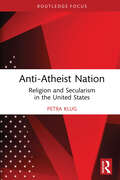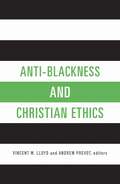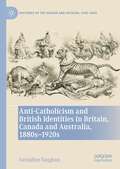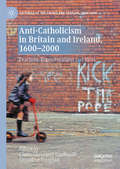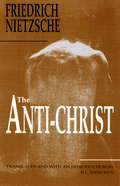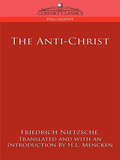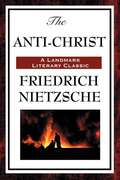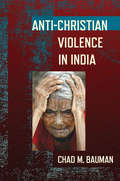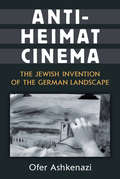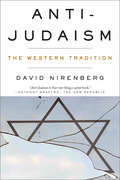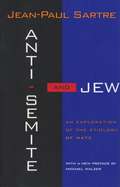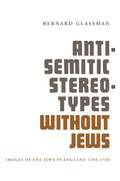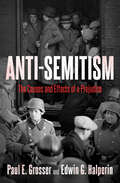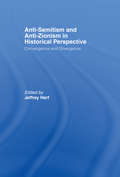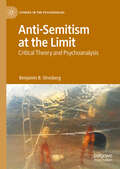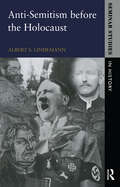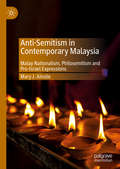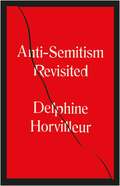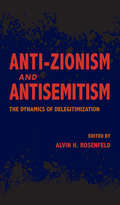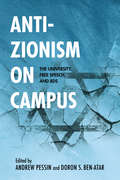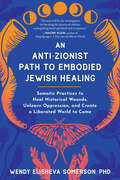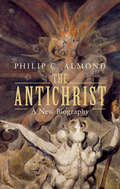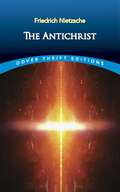- Table View
- List View
Anti-Atheist Nation: Religion and Secularism in the United States (Routledge Studies in the Sociology of Religion)
by Petra KlugAtheists are a growing but marginalized group in the American religious patchwork and they have been the target of ridicule and discrimination throughout the nation’s history. This book is the first comprehensive study of anti-atheism in the United States. It traces anti-atheism through five centuries of American history from colonization to the era of Donald Trump and contemporary conspiracy ideologies, such as the atheist New World Order. Describing anti-atheist prejudices and explaining the social and psychological mechanisms behind anti-atheist attitudes, it will appeal to scholars of sociology, religious studies and history with interests in religion in the United States.
Anti-Blackness and Christian Ethics
by Vincent W. Lloyd Andrew PrevotAnti-black racism is a central ethical crisis of our time. In this volume, leading experts explore how Christian ideas, practices, and institutions can contribute to today's struggle for racial justice and how those ideas, practices, and institutions need to be re imagined in light of the challenges to white supremacy posed by today's movements for racial justice. The book will appeal to scholars, students, activists, and Christians of all races who believe that black lives matter.
Anti-Catholicism and British Identities in Britain, Canada and Australia, 1880s-1920s (Histories of the Sacred and Secular, 1700–2000)
by Geraldine VaughanRecent debates about the definition of national identities in Britain, along with discussions on the secularisation of Western societies, have brought to light the importance of a historical approach to the notion of Britishness and religion. This book explores anti-Catholicism in Britain and its Dominions, and forms part of a notable revival over the last decade in the critical historical analysis of anti-Catholicism. It employs transnational and comparative historical approaches throughout, thanks to the exploration of relevant original sources both in the United Kingdom and in Australia and Canada, several of them untapped by other scholars. It applies a 'four nations' approach to British history, thus avoiding an Anglocentric viewpoint.
Anti-Catholicism in Britain and Ireland, 1600–2000: Practices, Representations and Ideas (Histories of the Sacred and Secular, 1700–2000)
by Claire Gheeraert-Graffeuille Geraldine VaughanThis edited collection brings together varying angles and approaches to tackle the multi-dimensional issue of anti-Catholicism since the Protestant Reformation in Britain and Ireland. It is of course difficult to infer from such geographically and historically diverse studies one single contention, but what the book as a whole suggests is that there can be no teleological narration of anti-Catholicism – its manifestations were episodic, more or less rooted in common worldviews, and its history does not end today.
The Anti-Christ
by H. L. Mencken Friedrich NietzscheThis is Nietzsche's last book and a fitting capstone to his career. It's succinct, biting, and encapsulates the criticisms of Christianity found in his other works. This edition contains an 8,000-word introduction by its translator, the famous iconoclastic writer H. L. Mencken.
The Anti-Christ
by Friedrich Nietzsche"The Christian concept of a god-the god as the patron of the sick, the god as a spinner of cobwebs, the god as a spirit-is one of the most corrupt concepts that has ever been set up in the world... In him nothingness is deified, and the will to nothingness is made holy." See Sharp Press; Tuscon, AZ -from The Anti-Christ. He's one of the most debated thinkers of the 19th century: Nietzsche and his works have been by turns vilified, lauded, and subjected to numerous contradictory interpretations, and yet he remains a figure of profound import, and his works a necessary component of a well-rounded education. The Anti-Christ, first published in German in 1895, is absolutely vital to any meaningful understanding of Nietzsche the man and Nietzsche the philosopher. An insightful and entertaining indictment of Christianity, it has enraged and inspired generations of readers, and this 1920 translation, by H. L. Mencken, considered the best available, is almost as controversial as the work itself, highlighting the darkest side of Mencken's cynicism. Also available from Cosimo Classics: Nietzsche's The Use and Abuse of History.
The Anti-Christ
by Friedrich NietzscheHere is Friedrich Nietzsche's great masterpiece The Anti-Christ, wherein Nietzsche attacks Christianity as a blight on humanity. This classic is essential reading for anyone wishing to understand Nietzsche and his place within the history of philosophy. "We should not deck out and embellish Christianity: it has waged a war to the death against this higher type of man, it has put all the deepest instincts of this type under its ban, it has developed its concept of evil, of the Evil One himself, out of these instincts-the strong man as the typical reprobate, the 'outcast among men.' Christianity has taken the part of all the weak, the low, the botched; it has made an ideal out of antagonism to all the self-preservative instincts of sound life; it has corrupted even the faculties of those natures that are intellectually most vigorous, by representing the highest intellectual values as sinful, as misleading, as full of temptation. The most lamentable example: the corruption of Pascal, who believed that his intellect had been destroyed by original sin, whereas it was actually destroyed by Christianity!" -Friedrich Nietzsche
The Anti-Christ, Ecce Homo, Twilight of the Idols: And Other Writings
by Friedrich NietzscheNietzsche's late works are brilliant and uncompromising, and stand as monuments to his lucidity, rigor, and style. This volume combines, for the first time in English, five of these works: The Antichrist, Ecce Homo, Twilight of the Idols, Nietzsche contra Wagner, and The Case of Wagner. Nietzsche takes on some of his greatest adversaries in these works: traditional religion, contemporary culture, and above all, his one-time hero, Richard Wagner. His writing is simultaneously critical and creative, revealing his alternative philosophical vision, which, after more than a hundred years, still retains its audacious originality.
Anti-Christian Violence in India (Religion and Conflict)
by Chad M. BaumanDoes religion cause violent conflict, asks Chad M. Bauman, and if so, does it cause conflict more than other social identities? Through an extended history of Christian-Hindu relations, with particular attention to the 2007–2008 riots in Kandhamal, Odisha, Anti-Christian Violence in India examines religious violence and how it pertains to broader aspects of humanity. Is "religious" conflict sui generis, or is it merely one species of intergroup conflict? Why and how might violence become an attractive option for religious actors? What explains the increase in religious violence over the last twenty to thirty years?Integrating theories of anti-Christian violence focused on politics, economics, and proselytization, Anti-Christian Violence in India additionally weaves in recent theory about globalization and, in particular, the forms of resistance against Western secular modernity that globalization periodically helps to provoke. With such theories in mind, Bauman explores the nature of anti-Christian violence in India, contending that resistance to secular modernities is, in fact, an important but often overlooked reason behind Hindu attacks on Christians. Intensifying the widespread Hindu tendency to think of religion in ethnic rather than universal terms, the ideology of Hindutva, or "Hinduness," explicitly rejects both the secular privatization of religion and the separability of religions from the communities that incubate them. And so, with provocative and original analysis, Bauman questions whether anti-Christian violence in contemporary India is really about religion, in the narrowest sense, or rather a manifestation of broader concerns among some Hindus about the Western sociopolitical order with which they associate global Christianity.
Anti-Heimat Cinema: The Jewish Invention of the German Landscape (Social History, Popular Culture, And Politics In Germany)
by Ofer AshkenaziAnti-Heimat Cinema: The Jewish Invention of the German Landscape studies an overlooked yet fundamental element of German popular culture in the twentieth century. In tracing Jewish filmmakers’ contemplations of “Heimat”—a provincial German landscape associated with belonging and authenticity—it analyzes their distinctive contribution to the German identity discourse between 1918 and 1968. In its emphasis on rootedness and homogeneity Heimat seemed to challenge the validity and significance of Jewish emancipation. Several acculturation-seeking Jewish artists and intellectuals, however, endeavored to conceive a notion of Heimat that would rather substantiate their belonging. This book considers Jewish filmmakers’ contribution to this endeavor. It shows how they devised the landscapes of the German “Homeland” as Jews, namely, as acculturated “outsiders within.” Through appropriation of generic Heimat imagery, the films discussed in the book integrate criticism of national chauvinism into German mainstream culture from World War I to the Cold War. Consequently, these Jewish filmmakers anticipated the anti-Heimat film of the ensuing decades, and functioned as an uncredited inspiration for the critical New German Cinema.
Anti-Judaism: The Western Tradition
by David Nirenberg"Exhilarating . . . a scholarly tour de force. The story Nirenberg has to tell is not over."--Adam Kirsch, Tablet This incisive history upends the complacency that confines anti-Judaism to the ideological extremes in the Western tradition. With deep learning and elegance, David Nirenberg shows how foundational anti-Judaism is to the history of the West. Questions of how we are Jewish and, more critically, how and why we are not have been churning within the Western imagination throughout its history. Ancient Egyptians, Greeks, and Romans; Christians and Muslims of every period; even the secularists of modernity have used Judaism in constructing their visions of the world. The thrust of this tradition construes Judaism as an opposition, a danger often from within, to be criticized, attacked, and eliminated. The intersections of these ideas with the world of power--the Roman destruction of the Second Temple, the Spanish Inquisition, the German Holocaust--are well known. The ways of thought underlying these tragedies can be found at the very foundation of Western history.
Anti-Semite and Jew: An Exploration of the Etiology of Hate
by Jean-Paul Sartre George BeckerA classic study from the author of philosophy which is a must-read for any serious student of the aetiology of hatred.
Anti-Semitic Stereotypes without Jews: Images of the Jews in England 1290-1700
by Bernard GlassmanAnti-Semitic Stereotypes Without Jews offers an exploration of English history, 1290- 1700, tracing the growth and development of these attitudes. It demonstrates that it is possible for prejudice to thrive even in the absence of a scapegoat group. Following the expulsion in the year 1290 until 1656, although there was no real Jewish community in England, the molders of public opinion kept a shadowy image of the Jew alive through sermons and religious tracts, travelogues, folklore, religious and secular drama. In his analysis, Dr. Glassman shows that despite their theological differences, Anglican, Puritan, and Catholic clergymen concurred in the negative images of Jews presented to their congregations. They pictured the Jews as Christ-killers, and related myths of how Jews performed barbaric and sacrilegious rituals. The image was to plague Anglo-Jewry after a small community was reestablished in the second half of the 17th century. The author's belief that anti-Semitism is primarily a Christian problem transcends both time and place is covered by this volume. Anti-Semitic sentiments are seen here as reflecting deep-seated, irrational responses to the Jewish people, rooted in the teachings of the church and exploited by men who needed an outlet for religious, social, and economic frustrations.
Anti-Semitism: The Causes and Effects of a Prejudice
by Paul E Grosser Edwin G. HalperinThis study examines the long history of hatred Jews have endured at the hands of the Catholic Church from ancient Rome to the twentieth century. Anti-Semitism is one of the oldest, most persistent, and most virulent forms of hatred to plague the world. The Holocaust of World War II was the bitter fruit of centuries of prejudice passed down in Christian teachings and perceptions about the Jewish people. In this book, Paul E. Grosser and Edwin G. Haplerin present a historical analysis of anti-Semitism from the Roman Empire, through the Crusades, the Inquisition, the Reformation, and the twentieth century. Through their analysis, Grosser and Halperin reveal a pattern. They shed light on how, where, and when anti-Semitism has spread; how it is temporarily brought under control; and how it suddenly, in some far part of the world, becomes endemic again. The authors provide an illuminating survey of the causes of anti-Semitism and share theories of how the Jews have been able to survive. In conclusion, they offer some hope for the future.
Anti-Semitism and Anti-Zionism in Historical Perspective: Convergence and Divergence
by Jeffrey HerfPreviously published as a special issue of The Journal of Israeli History, this book presents the reflections of historians from Israel, Europe, Canada and the United States concerning the similarities and differences between anti-Zionism and anti-Semitism primarily in Europe and the Middle East. Spanning the past century, the essays explore the continuum of critique from early challenges to Zionism and they offer criteria to ascertain when criticism with particular policies has and has not coalesced into an "ism" of anti-Zionism and anti-Semitism. Including studies of England, France, Germany, Poland, the United States, Iran and Israel, the volume also examines the elements of continuity and break in European traditions of anti-Semitism and anti-Zionism when they diffused to the Arab and Islamic. Essential course reading for students of religious history.
Anti-Semitism at the Limit: Critical Theory and Psychoanalysis (Studies in the Psychosocial)
by Benjamin B. StrosbergIn this book, Benjamin Strosberg explores difficulties and anxieties inherent in studying, defining, and defending against anti-Semitism by tracing a concurrent difficulty in thinking about Jewishness, which has historically served as a limit case for central social categories such as outsider, religion, race, gender, and nation. Dr. Strosberg draws on Zygmunt Bauman’s concept of proteophobia—the anxious fear of what doesn’t fit into clear-cut categories—to think more carefully about anti-Semitism as response to the complex-realities of ambivalence and otherness. The book proposes ‘negative psychology’ as a methodology for studying anti-Semitism and proteophobia rooted in psychoanalysis and Theodor Adorno’s Critical Theory. Drawing from lived experiences, contemporary events, and debates in the field, this compelling work explores the broad implications of the investigation of anti-Semitism for politics, education, and psychoanalysis, as well as the specific implications for Jewish identity and resistance.
Anti-Semitism before the Holocaust (Seminar Studies)
by Albert S. LindemannAn important new study on a complex and highly controversial topic. Albert Lindemann provides a clear and balanced guide to anti-Semitism from ancient times right through to the twentieth-century inter-war period and the Nazi Holocaust. He looks at all countries where anti-Semitism manifested itself at different times and in different ways xxx; in Russia, the US, Poland, England, Germany, South Africa, and Holland. Throughout he asks difficult and unfamiliar questions to challenge long held and misguided beliefs. An important new study which fills a gap in current literature.
Anti-Semitism in Contemporary Malaysia: Malay Nationalism, Philosemitism and Pro-Israel Expressions (Palgrave Series In Asia And Pacific Studies)
by Mary J. AinslieOffering an empirical study into anti-Semitism and anti-Israel attitudes in Malaysia, this book examines the complicated nature and function of such beliefs within the contemporary context, mapping these discourses onto different ethnic and economic divisions. Based largely upon qualitative interviews with thirty Malaysian participants who detail their own experiences with and perceptions of this phenomenon, the project reveals how political actors and organizations in Malaysia achieve political success and maintain political power through investing in the Palestinian cause, simultaneously demonizing Israel and Jews to an astounding degree. However, the book also reveals how, in contrast to this state-led agenda, challenging anti-Semitism and pushing for dialogue with Israel has become a means by which progressive citizens can critique authorities and reassert their desire for a liberal and heterogenic Malaysia. The book therefore argues that both interest in and even support for Judaism and Israel may be more prominent than the official Malaysian position may suggest, with citizens holding far more complex opinions and views upon this subject matter.
Anti-Semitism Revisited: How the Rabbis Made Sense of Hatred
by Delphine HorvilleurRabbi Delphine Horvilleur analyses the phenomenon of anti-semitism as it is viewed by those who endure it and who, through narration and literature, succeed in overcoming it. Jewish texts are replete with treatments of anti-semitism, of this endlessly paradoxical hatred, and of the ways in which Jews are perceived by others. But here, the focus is inverted: Anti-Semitism Revisited explores the hatred of Jews as seen through the lens of the sacred texts, rabbinical tradition and Jewish lore. Delphine Horvilleur gives a voice to those who are too often deprived of one, examining resilience in the face of adversity and the legacy of an ancient hatred that is often misunderstood. An engaging, hopeful and very original examination of anti-semitism: what it means, where it comes from, what are the ancient myths and tropes that are weaponised against Jewish people, and how do we take them apart.
Anti-Semitism Revisited: How the Rabbis Made Sense of Hatred
by Delphine Horvilleur"Anti-Semitism revisited in a wholly original way" Philippe Sands"Rippling with ideas on every page" Jewish Chronicle"Tackles the issue [of anti-semitism] from the perspective of a country where its manifestations have been more vicious and deadly" Financial TimesRabbi Delphine Horvilleur analyses the phenomenon of anti-semitism as it is viewed by those who endure it and who, through narration and literature, succeed in overcoming it. Jewish texts are replete with treatments of anti-semitism, of this endlessly paradoxical hatred, and of the ways in which Jews are perceived by others. But here, the focus is inverted: Anti-Semitism Revisited explores the hatred of Jews as seen through the lens of the sacred texts, rabbinical tradition and Jewish lore. Delphine Horvilleur gives a voice to those who are too often deprived of one, examining resilience in the face of adversity and the legacy of an ancient hatred that is often misunderstood. An engaging, hopeful and very original examination of anti-semitism: what it means, where it comes from, what are the ancient myths and tropes that are weaponised against Jewish people, and how do we take them apart.Translated from the French by Ruth Diver
Anti-Zionism and Antisemitism: The Dynamics of Delegitimization (Studies in Antisemitism)
by Edited by Alvin H. RosenfeldSeventeen essays by scholars examining the links between anti-Semitism and attitudes toward Israel in the current political climate.How and why have anti-Zionism and antisemitism become so radical and widespread? This timely and important volume argues convincingly that today’s inflamed rhetoric exceeds the boundaries of legitimate criticism of the policies and actions of the state of Israel and conflates anti-Zionism with antisemitism. The contributors give the dynamics of this process full theoretical, political, legal, and educational treatment and demonstrate how these forces operate in formal and informal political spheres as well as domestic and transnational spaces. They offer significant historical and global perspectives of the problem, including how Holocaust memory and meaning have been reconfigured and how a singular and distinct project of delegitimization of the Jewish state and its people has solidified. This intensive but extraordinarily rich contribution to the study of antisemitism stands out for its comprehensive overview of an issue that is both historical and strikingly timely.
Anti-Zionism on Campus: The University, Free Speech, and BDS (Studies in Antisemitism)
by Doron S. Ben-Atar Andrew PessinMany scholars have endured the struggle against rising anti-Israel sentiments on college and university campuses worldwide. This volume of personal essays documents and analyzes the deleterious impact of the Boycott, Divestment, and Sanctions (BDS) movement on the most cherished Western institutions. These essays illustrate how anti-Israelism corrodes the academy and its treasured ideals of free speech, civility, respectful discourse, and open research. Nearly every chapter attests to the blurred distinction between anti-Israelism and antisemitism, as well as to hostile learning climates where many Jewish students, staff, and faculty feel increasingly unwelcome and unsafe. Anti-Zionism on Campus provides a testament to the specific ways anti-Israelism manifests on campuses and considers how this chilling and disturbing trend can be combatted.
An Anti-Zionist Path to Embodied Jewish Healing: Somatic Practices to Heal Historical Wounds, Unlearn Oppression, and Create a Liberated World to Come
by Wendy Elisheva Somerson PhDUnapologetically anti-Zionist and firmly rooted in Jewish spiritual values—a liberatory model for Jewish healing Body-based tools and faith-based practices for processing trauma, reclaiming our agency, and building a world where "never again" means "never again for anyone""...an accessible pathway for healing from historical trauma, releasing it from our bodies, and preventing it from being passed on to future generations. This may well be the missing piece for breaking the pattern of violence undergirding Israeli apartheid and occupation.&”—Naomi Klein, author of Doppelganger: A Trip Into the Mirror World Dr. Wendy Elisheva Somerson, PhD, shows how Jewish history lives in Jewish bodies—and how antisemitism and oppression disrupt our access to safety, dignity, and belonging. This unmetabolized trauma can lock us into a survival state that brings historical grief into the present moment…and keep us from exploring critical questions that help us tend our legacies and live into a better world.How does ancestral grief live on in our bodies and keep us from feeling safe—and how is that fear enacted on other peoples? How do we reconcile a history of persecution with the state power of Israel today?Each chapter invites us back into the body, exploring healing as a spiritual and political reclamation. With skills-based wisdom for trauma, safety, spiritually grounded intentions, and resourcing ourselves for difficult conversations, this book also helps readers understand: Trauma and healing through our bodiesJewish longing, belonging, legacies of assimilationHealing shame—of not being Jewish enough, of being too much, and of being complicitEmbodied experiences of Jewish resilience, ritual, and griefRooted in justice, care, and spiritual depth, this book asks us to live into a Judaism beyond Zionism. It invites us to heal toward liberation—to reclaim Jewish faith and release Jewish identity from the colonial project of Israel in power, skill, and community.
The Antichrist: A New Biography
by Philip C. AlmondThe malign figure of the Antichrist endures in modern culture, whether religious or secular; and the spectral shadow he has cast over the ages continues to exert a strong and powerful fascination. Philip C. Almond tells the story of the son of Satan from his early beginnings to the present day, and explores this false Messiah in theology, literature and the history of ideas. Discussing the origins of the malevolent being who at different times was cursed as Belial, Nero or Damien, the author reveals how Christianity in both East and West has imagined this incarnation of absolute evil destined to appear at the end of time. For the better part of the last two thousand years, Almond suggests, the human battle between right and wrong has been envisaged as a mighty cosmic duel between good and its opposite, culminating in an epic final showdown between Christ and his deadly arch-nemesis.
The Antichrist: In English Translation (Dover Thrift Editions)
by Friedrich Nietzsche"In truth there was only one Christian, and he died on the cross," declares Friedrich Nietzsche in this famous attack on Christianity and organized religion. A deep exploration and repudiation of Christian symbolism and morality, The Antichrist was the last of Nietzsche's works save for his autobiography, Ecco Homo. As such, it may be regarded as a final statement of some of his most important ideas. This polemic is also one of the philosopher's most conventionally formatted books, consisting of a connected argument with few digressions and a clearly defined beginning, middle, and end. Indeed, it ranks among philosophy's most accessible and easily understood works, consisting of 62 brief chapters. Each chapter features an aphorism that advances the author's arguments against Christian tenets. Fast-paced, concise, and brimming with conviction, Nietzsche's landmark work is essential to a grasp of his complete oeuvre.
